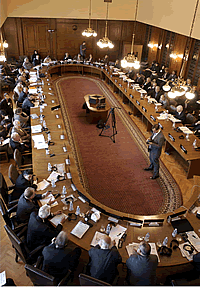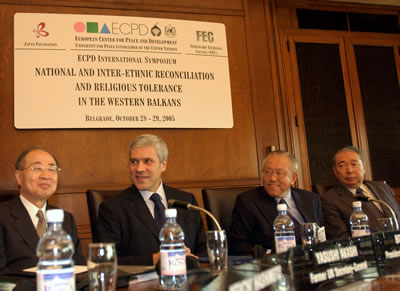
One of the major characteristics of the Balkans is its multi-national, multi-confessional and multi-cultural composition. Throughout history, however, these values were not used as advantages but, rather, as causes for disputes and occasional conflicts among peoples and states. In the last fifteen years, the Balkans, especially its western part, was faced with two extreme issues: armed conflicts and economic transition, which had a strong influence on development of the region as a whole.

On October 28-29, 2005, in Belgrade, the capital of Serbia, avery important gathering of renowned intellectuals and public figures from various parts of the world was held. The aim of the meeting was to discuss one of the most pressing issues of Europe today, that is the threat to peace and stability in the Western Balkans, caused inter alia by inter-ethnic and inter-confessional disputes, and to seek solution for them. The gathering was organized by the European Center for Peace and Development (ECPD) of the United Nations University for Peace, Belgrade, in cooperation with and supported by the Japanese Government. More precisely, the Japan Foundation and the Friendship Exchange Council (FEC) were the partners – organizations closely linked with the Japanese Ministry of Foreign Affairs.
Participants were from all of the Western Balkan countries, several other European countries, the USA and Japan. Among them there were such distinguished persons as Yasushi Akashi, long standing Under-Secretary of the UN Secretary-General, and the former UN Representative for Yugoslavia; Sir James Mancham, President of the World Forum for Peace and Tolerance and former President of the Republic of Seychelles; Janez Stanovnik, former Executive Secretary of the UN Economic Commission for Europe and former President of the Republic of Slovenia; academician Branislav Šoškić, former President of the Republic of Montenegro; Paskal Milo, former Minister of Foreign Affairs of Albania, and member of the Albanian Academy of Sciences and Arts. Due to private or professional reasons, several invitees were unable to come and several of them (Nano Ružin, Macedonian Ambassador to NATO; Aleksandar Mitić, lecturer at Lund University; and Slavko Milosavlevski, professor at University of Skopje, Macedonia) sent their papers which were copied and distributed among participants. Boris Tadić, President of the Republic of Serbia, delivered his welcome address.
Takehiro Togo, renowned Japanese diplomat, professor of international relations and President of the ECPD Academic Council, presided the meeting which was held in five plenary sessions. Each session, chaired by a different person, had four or five speakers, and an open discussion lasting an hour, on average. Most of the speakers submitted their written papers which have been published in the Proceedings. The speeches and discussions, in general, were compatible with the aims and the nature of the Symposium, although some views, both on the causes of the issues and the ways of overcoming them, were expressed.

HE Yasushi Akashi, Under-Secretary of the UN Secretary-General, Boris Tadic, President of Republic of Serbia, HE Takehiro Togo, President of the ECPD Council and HE Tadashi Nagai, Ambassador of Japan to Republic of Serbia
At the Symposium it was strongly emphasised that the wounds inflicted on hearts and minds of peoples of all ethnic groups and faiths in the Western Balkans were too deep and too painful, and that a lot of time and patience will be needed to heal them. It was also emphasised that the Western Balkans is still in a state of alert.
Currently, the major problem within the Western Balkans is the Kosovo crisis. Resolving it in a satisfactory way for all sides would mean a significant contribution to peace and stability in the region as a whole. Non-governmental organizations, as it was pointed out, could help, but the responsibility for managing the crisis and dealing with the difficulties, essentially, belongs to the International Community.

Taking into account these suggestions and other circumstances, the ECPD Academic Council, at its session following up to the Symposium, decided to establish an International Conference and a Permanent Study Group, which will consist of up to twenty scientific and public figures from all around the world. The Group will have a task to study the inter-ethnic and inter-confessional relations in the Balkans, and to submit, occasionally, corresponding reports and/or studies. The Conference will take place annually. The first Conference meeting will be held at the end of October, 2006.
Related documents:
· Agenda of the ECPD International Symposium

